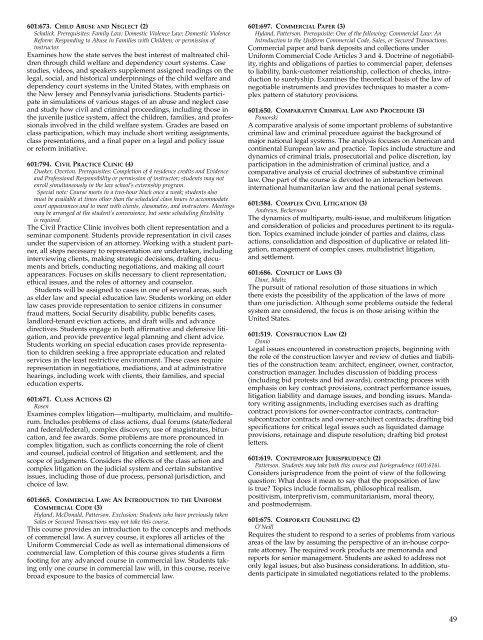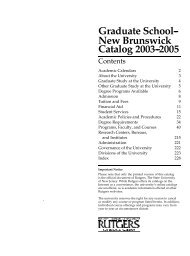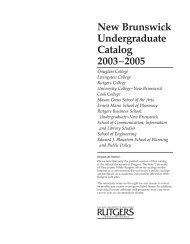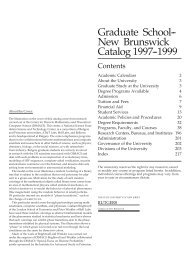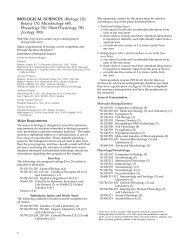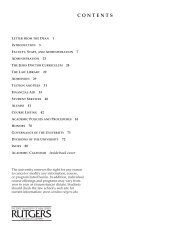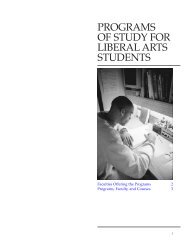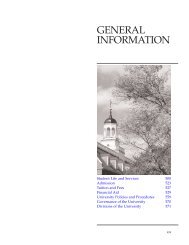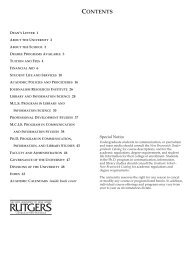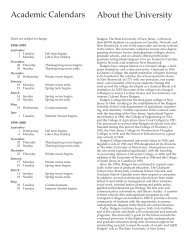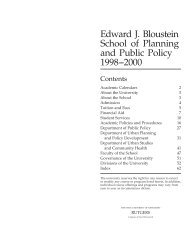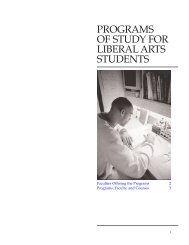Rutgers University School of Law-Camden - Catalogs - Rutgers, The ...
Rutgers University School of Law-Camden - Catalogs - Rutgers, The ...
Rutgers University School of Law-Camden - Catalogs - Rutgers, The ...
You also want an ePaper? Increase the reach of your titles
YUMPU automatically turns print PDFs into web optimized ePapers that Google loves.
601:673. CHILD ABUSE AND NEGLECT (2)<br />
Schalick. Prerequisites: Family <strong>Law</strong>; Domestic Violence <strong>Law</strong>; Domestic Violence<br />
Reform: Responding to Abuse in Families with Children; or permission <strong>of</strong><br />
instructor.<br />
Examines how the state serves the best interest <strong>of</strong> maltreated children<br />
through child welfare and dependency court systems. Case<br />
studies, videos, and speakers supplement assigned readings on the<br />
legal, social, and historical underpinnings <strong>of</strong> the child welfare and<br />
dependency court systems in the United States, with emphasis on<br />
the New Jersey and Pennsylvania jurisdictions. Students participate<br />
in simulations <strong>of</strong> various stages <strong>of</strong> an abuse and neglect case<br />
and study how civil and criminal proceedings, including those in<br />
the juvenile justice system, affect the children, families, and pr<strong>of</strong>essionals<br />
involved in the child welfare system. Grades are based on<br />
class participation, which may include short writing assignments,<br />
class presentations, and a final paper on a legal and policy issue<br />
or reform initiative.<br />
601:794. CIVIL PRACTICE CLINIC (4)<br />
Dueker, Overton. Prerequisites: Completion <strong>of</strong> 4 residence credits and Evidence<br />
and Pr<strong>of</strong>essional Responsibility or permission <strong>of</strong> instructor; students may not<br />
enroll simultaneously in the law school’s externship program.<br />
Special note: Course meets in a two-hour block once a week; students also<br />
must be available at times other than the scheduled class hours to accommodate<br />
court appearances and to meet with clients, classmates, and instructors. Meetings<br />
may be arranged at the student’s convenience, but some scheduling flexibility<br />
is required.<br />
<strong>The</strong> Civil Practice Clinic involves both client representation and a<br />
seminar component. Students provide representation in civil cases<br />
under the supervision <strong>of</strong> an attorney. Working with a student partner,<br />
all steps necessary to representation are undertaken, including<br />
interviewing clients, making strategic decisions, drafting documents<br />
and briefs, conducting negotiations, and making all court<br />
appearances. Focuses on skills necessary to client representation,<br />
ethical issues, and the roles <strong>of</strong> attorney and counselor.<br />
Students will be assigned to cases in one <strong>of</strong> several areas, such<br />
as elder law and special education law. Students working on elder<br />
law cases provide representation to senior citizens in consumer<br />
fraud matters, Social Security disability, public benefits cases,<br />
landlord-tenant eviction actions, and draft wills and advance<br />
directives. Students engage in both affirmative and defensive litigation,<br />
and provide preventive legal planning and client advice.<br />
Students working on special education cases provide representation<br />
to children seeking a free appropriate education and related<br />
services in the least restrictive environment. <strong>The</strong>se cases require<br />
representation in negotiations, mediations, and at administrative<br />
hearings, including work with clients, their families, and special<br />
education experts.<br />
601:671. CLASS ACTIONS (2)<br />
Rosen<br />
Examines complex litigation—multiparty, multiclaim, and multiforum.<br />
Includes problems <strong>of</strong> class actions, dual forums (state/federal<br />
and federal/federal), complex discovery, use <strong>of</strong> magistrates, bifurcation,<br />
and fee awards. Some problems are more pronounced in<br />
complex litigation, such as conflicts concerning the role <strong>of</strong> client<br />
and counsel, judicial control <strong>of</strong> litigation and settlement, and the<br />
scope <strong>of</strong> judgments. Considers the effects <strong>of</strong> the class action and<br />
complex litigation on the judicial system and certain substantive<br />
issues, including those <strong>of</strong> due process, personal jurisdiction, and<br />
choice <strong>of</strong> law.<br />
601:665. COMMERCIAL LAW: AN INTRODUCTION TO THE UNIFORM<br />
COMMERCIAL CODE (3)<br />
Hyland, McDonald, Patterson. Exclusion: Students who have previously taken<br />
Sales or Secured Transactions may not take this course.<br />
This course provides an introduction to the concepts and methods<br />
<strong>of</strong> commercial law. A survey course, it explores all articles <strong>of</strong> the<br />
Uniform Commercial Code as well as international dimensions <strong>of</strong><br />
commercial law. Completion <strong>of</strong> this course gives students a firm<br />
footing for any advanced course in commercial law. Students taking<br />
only one course in commercial law will, in this course, receive<br />
broad exposure to the basics <strong>of</strong> commercial law.<br />
601:697. COMMERCIAL PAPER (3)<br />
Hyland, Patterson. Prerequisite: One <strong>of</strong> the following: Commercial <strong>Law</strong>: An<br />
Introduction to the Uniform Commercial Code, Sales, or Secured Transactions.<br />
Commercial paper and bank deposits and collections under<br />
Uniform Commercial Code Articles 3 and 4. Doctrine <strong>of</strong> negotiability,<br />
rights and obligations <strong>of</strong> parties to commercial paper, defenses<br />
to liability, bank-customer relationship, collection <strong>of</strong> checks, introduction<br />
to suretyship. Examines the theoretical basis <strong>of</strong> the law <strong>of</strong><br />
negotiable instruments and provides techniques to master a complex<br />
pattern <strong>of</strong> statutory provisions.<br />
601:650. COMPARATIVE CRIMINAL LAW AND PROCEDURE (3)<br />
Pomorski<br />
A comparative analysis <strong>of</strong> some important problems <strong>of</strong> substantive<br />
criminal law and criminal procedure against the background <strong>of</strong><br />
major national legal systems. <strong>The</strong> analysis focuses on American and<br />
continental European law and practice. Topics include structure and<br />
dynamics <strong>of</strong> criminal trials, prosecutorial and police discretion, lay<br />
participation in the administration <strong>of</strong> criminal justice, and a<br />
comparative analysis <strong>of</strong> crucial doctrines <strong>of</strong> substantive criminal<br />
law. One part <strong>of</strong> the course is devoted to an interaction between<br />
international humanitarian law and the national penal systems.<br />
601:584. COMPLEX CIVIL LITIGATION (3)<br />
Andrews, Beckerman<br />
<strong>The</strong> dynamics <strong>of</strong> multiparty, multi-issue, and multiforum litigation<br />
and consideration <strong>of</strong> policies and procedures pertinent to its regulation.<br />
Topics examined include joinder <strong>of</strong> parties and claims, class<br />
actions, consolidation and disposition <strong>of</strong> duplicative or related litigation,<br />
management <strong>of</strong> complex cases, multidistrict litigation,<br />
and settlement.<br />
601:686. CONFLICT OF LAWS (3)<br />
Dane, Maltz<br />
<strong>The</strong> pursuit <strong>of</strong> rational resolution <strong>of</strong> those situations in which<br />
there exists the possibility <strong>of</strong> the application <strong>of</strong> the laws <strong>of</strong> more<br />
than one jurisdiction. Although some problems outside the federal<br />
system are considered, the focus is on those arising within the<br />
United States.<br />
601:519. CONSTRUCTION LAW (2)<br />
Donio<br />
Legal issues encountered in construction projects, beginning with<br />
the role <strong>of</strong> the construction lawyer and review <strong>of</strong> duties and liabilities<br />
<strong>of</strong> the construction team: architect, engineer, owner, contractor,<br />
construction manager. Includes discussion <strong>of</strong> bidding process<br />
(including bid protests and bid awards), contracting process with<br />
emphasis on key contract provisions, contract performance issues,<br />
litigation liability and damage issues, and bonding issues. Mandatory<br />
writing assignments, including exercises such as drafting<br />
contract provisions for owner-contractor contracts, contractorsubcontractor<br />
contracts and owner-architect contracts; drafting bid<br />
specifications for critical legal issues such as liquidated damage<br />
provisions, retainage and dispute resolution; drafting bid protest<br />
letters.<br />
601:619. CONTEMPORARY JURISPRUDENCE (2)<br />
Patterson. Students may take both this course and Jurisprudence (601:616).<br />
Considers jurisprudence from the point <strong>of</strong> view <strong>of</strong> the following<br />
question: What does it mean to say that the proposition <strong>of</strong> law<br />
is true? Topics include formalism, philosophical realism,<br />
positivism, interpretivism, communitarianism, moral theory,<br />
and postmodernism.<br />
601:675. CORPORATE COUNSELING (2)<br />
O’Neill<br />
Requires the student to respond to a series <strong>of</strong> problems from various<br />
areas <strong>of</strong> the law by assuming the perspective <strong>of</strong> an in-house corporate<br />
attorney. <strong>The</strong> required work products are memoranda and<br />
reports for senior management. Students are asked to address not<br />
only legal issues, but also business considerations. In addition, students<br />
participate in simulated negotiations related to the problems.<br />
49


